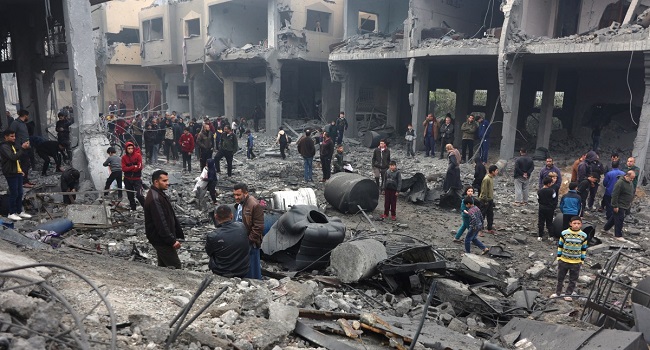The latest wave of airstrikes followed the announcement of a tentative ceasefire agreement brokered by Qatar and the United States, set to take effect on Sunday.
Despite initial celebrations in Gaza after the ceasefire news, residents awoke to scenes of devastation on Thursday, with rising smoke, collapsed buildings, and mounting casualties. Saeed Alloush, a local resident, expressed the drastic shift in emotions, describing how what had been the most joyous night since October 7 quickly turned into mourning upon hearing that 40 people, including his uncle, had been killed.
According to Mahmud Bassal, spokesperson for Gaza’s civil defense agency, at least 73 people had lost their lives in Israeli airstrikes since the ceasefire announcement, including 20 children and 25 women, with around 200 others wounded.
By morning, crowds gathered at the sites of destroyed buildings, sifting through debris and scattered personal belongings. Similar scenes were observed across the densely populated enclave, home to 2.4 million people, most of whom have been displaced multiple times since the conflict began in October 2023.
At Nasser Hospital in Khan Yunis, medical staff worked to clear bloodstained mortuary stretchers after a deadly strike. Meanwhile, at Al-Ahli Hospital in Gaza City, grieving families knelt beside the shrouded bodies of their loved ones.
Rescue worker Ibrahim Abu al-Rish recounted how, shortly after the ceasefire was announced, a five-story building housing more than 50 people was hit. Throughout the night, first responders and locals, using headlamps to illuminate the destruction, searched desperately for survivors amid the ruins of Gaza City.
Abu al-Rish, an ambulance driver, reported that despite the impending truce, shelling continued, with homes being struck one after another.
In Al-Bureij refugee camp in central Gaza, resident Mahmud al-Qarnawi emphasized that the situation remained dire, with airstrikes ongoing and uncertainty looming until the ceasefire officially takes effect. Others in nearby Nuseirat expressed similar concerns, fearing that the days leading up to the truce could be even deadlier.
International medical organization Doctors Without Borders (MSF) echoed these concerns, with emergency coordinator Amande Bazerolle describing a night that began with hopeful celebrations but quickly turned into one of intense violence.
As discussions continued, Israel’s cabinet was expected to approve the ceasefire deal later that day. However, Prime Minister Benjamin Netanyahu’s office accused Hamas of reneging on aspects of the agreement.
Mediators Qatar and the United States confirmed that Israel and Hamas had reached an agreement for a truce beginning Sunday, which would include a hostage and prisoner exchange. If implemented, 33 hostages would be released in the initial phase, according to Qatari Prime Minister Sheikh Mohammed bin Abdulrahman bin Jassim Al-Thani.
The war erupted following Hamas’s attack on Israel, which resulted in 1,210 deaths, mostly civilians, based on official Israeli figures. In response, Israel launched a military campaign in Gaza that has since claimed 46,788 lives, the majority civilians, according to Gaza’s health ministry, whose figures are considered reliable by the United Nations.


No comments:
Post a Comment